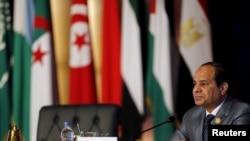New anti-terrorism legislation in Egypt is targeting the media and making it a criminal offense to publish news contradicting the government’s version of events in terrorism-related cases.
Local journalists say the move is a further major setback for their profession and argue authorities are intent on having a media of “one opinion and one narrative.”
The draft anti-terrorism legislation, which was passed by the Cabinet last week and is waiting the approval President Abdel Fattah el-Sissi, imposes a minimum two-year jail term for reporting “false news or data about any terrorist operations that contradicts the official statements released by the relevant authorities.”
It comes just days after the Egyptian leader pledged tough measures to combat terrorism after the June assassination of the country's top public prosecutor in a Cairo car bombing.
North Sinai situation
Last week’s media coverage of coordinated assaults by Islamic State militants in North Sinai, which showed a glaring discrepancy between the government’s death toll of soldiers in the attacks with what local and foreign media reported, is likely also to have goaded the government to act, say rights activists.
In a statement, Egypt’s Journalists' Syndicate warned the new anti-terror legislation “transcends the main goal of the law of combating terrorism to appropriating freedom of the press.”
The syndicate added: “It appropriates the right of the journalist to acquire information from different sources and limits it to one side. This is a clear setback for the freedom of thought and press.”
The anti-terrorism draft law lists more than 25 crimes, a dozen are punishable by death.
Egypt’s justice minister, Ahmed el-Zind, told the French news service “There was no choice but to impose some standards. The government has the duty to defend citizens from wrong information … I hope no one interprets this as a restriction on media freedoms. It’s just about numbers.”
In the clashes between the military and Islamic extremists last week the foreign and local media reported significantly higher casualties than the army, which denied it lost more than 17 soldiers. Most press reports put the military’s death toll at more than 50 and as high as 70.
The law is the latest clash between Egypt’s increasingly authoritarian government and civil society and the media. According to media rights group the Committee to Protect Journalists, which is based in New York, at least 18 journalists are currently in jail on a variety of charges.
A trio of al-Jazeera journalists, who have been accused of terrorism, are currently on bail. In June, the Cairo correspondent of the Spanish newspaper El País left the country after his embassy warned him he was likely to be arrested.
"The threat of imprisonment in Egypt is part of an atmosphere in which authorities pressure media outlets to censor critical voices," said CPJ.
Since the army-led coup on the back of street protests two years ago that saw the ouster of Islamist Mohamed Morsi from the presidency, the government has introduced draconian legislation, arguing that the challenge from Islamic militants warrants the harsh moves.
It has also arrested thousands of members of the Muslim Brotherhood, which it accuses of being in league with terrorists and responsible for terrorism itself.
Egyptian officials didn’t disguise their anger at the reporting of last week’s Sinai clashes, in which they say at least a hundred militants were killed. The Defense Ministry singled out Al-Jazeera and some regional channels for their coverage, accusing them of promoting “anti-military propaganda.”
Constitution cited
Local journalists say the new anti-terror legislation contravenes the constitution.
“The law will transform journalists into machines automatically publishing official statements without thinking,” warned Gamal Abdel Rehim, under-secretary of the Journalists' Syndicate.
Other articles in the proposed legislation, which has to be reviewed by the State Council, a judicial advisory body, also are attracting criticism from rights watchdogs, including jail terms for promoting “terrorist crimes” or writing or broadcasting anything “disrupting the course of justice.” Recording or broadcasting the proceeds of trials without court approval also is banned.
Over the weekend, former general el-Sissi, wearing combat fatigues for the first time in more than a year, said in last week’s clashes in the Sinai Peninsula, the army thwarted an attempt by the Islamic State group to set up an extremist state.
The group wanted to establish “an Islamic State in Sinai," he said. “No one can impose on the Egyptians something they don't want. To reach the Egyptians they have to pass through the army, the sons of Egypt.”
The clash began when militants attacked several army checkpoints in a wave of suicide bombings and besieged a police station.
The Egyptian Foreign Ministry has blamed all the recent violence on the Muslim Brotherhood, claiming it coordinates with the Islamic State.




